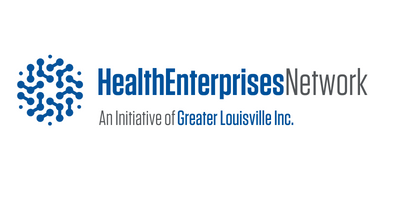The COVID-19 pandemic has disrupted Louisville’s economic system, including our region’s healthcare sector. Our companies, organizations and institutions have faced many challenges since the pandemic began, but they are also finding ways to succeed in the new normal. The Health Enterprises Network (HEN) lead a discussion with Louisville’s leading economic development partners in early October as part of the mission to foster the growth of the region’s health-related economy.
The roundtable was moderated by Michael Bryant, Executive VP and Chief Administrative Officer at Trilogy Health Services. Bryant summarized the mission of HEN and the purpose of this event. “Our goal is to convene healthcare leaders and facilitate a dialogue so that we can all work together to champion and foster the growth of the health-related business community. Economic development is a key aspect of this mission and we are fortunate to have several groups who are focusing in on this in the community.”
Bryant gave a brief history of HEN. Over the past 20 years, the organization has continued to work toward the mission, while evolving and adding programming. Bryant said, “It is important to look at how the ecosystem has evolved, what resources exist today that did not exist 20 years ago, and how are partners are working together.”
Key Partners
Four key partners joined the panel to discuss opportunities Louisville has to create a stronger healthcare economy post COVID-19.
As for how the protests downtown are affecting the healthcare economy, John Launius, acting VP of Regional Economic Development at Greater Louisville Inc. said, “Downtown is incredibly important. We have a significant medical district downtown, which is important to the healthcare ecosystem. It’s going to take collaboration to generate local interest and investment to nurture it. Downtown has seen advancement in the past five years and we should recapture that momentum to the benefit of our healthcare ecosystem.”
Downtown is home to more than 50,000 workers in the central business district. Benjamin Moore, Senior Economic Development Manager at Louisville Forward, said, “Downtown has seen growth. Billions have been invested in the central business district. Projects announced and underway are still on the board, despite COVID-19.” Moore sees a bright future in 2021, “There is a serendipitous collision when people bump into each other in NULU or the medical district and ideas and companies are formed. Innovation doesn’t happen in a bubble.”
Tammy York Day, President & CEO at Louisville Healthcare CEO Council, agreed. “In addition to being a compassionate city, we are also an opportunity city,” Day said. “It’s important we are part of the solution even during a pandemic and racial unrest. We need to build the infrastructure and provide opportunities.”
Available Resources
Bryant pivoted to available resources in our community, such as angel investors and venture capital, to get projects started.
William Metcalf, Executive Director at UofL Research Development & Strategic Initiatives, said that capital is important to starting a new venture, specifically growing a new healthcare business. Metcalf said, “There is access to capital which is growing. I’m excited that the Louisville Healthcare CEO Council (LHCC) has announced a capital investment fund.”
There are more investment dollars now. “It’s being strategic about how we approach that access to capital that has me excited. Louisville Entrepreneurship Acceleration Programs (LEAP) is refocused to healthcare and I’m excited about the next iteration, looking at identifying healthcare needs and growing innovations in that space in a mindful way,” Day said. “We need to let the rest of the country know what we have in relation to aging innovation. We have ideas that are expandable and can be duplicated for national solutions. That puts us on the map.”
Moore thinks we are in a better position than we have been but had some advice for locals. “The ultimate form of buying local is buying local companies. Let’s invest! Instead of buying a Subway franchise, buy a startup instead. Instead of buying a horse, buy a startup instead. It’s a better return.”
Moore cited Talaris Therapeutics as the best example of a homegrown solution that will save lives. Talaris is a privately held biotechnology company developing transformative cell therapies that have the potential to eliminate the burden of chronic immunosuppression for organ transplant recipients. According to Moore, Talaris raised $110 million this round and $115 million in the last round. “That’s $215 million for a Louisville company. We should be proud of that! We can do this here!” Moore said.
Gaps
Bryant ended the discussion around gaps in the health-related economy that need to be filled, asking, “How can we work together to address those gaps?”
Metcalf said, “The more tech training the better,” citing the recent $6 million grant from the National Security Agency to support cyber security talent and training specifically on the healthcare space.
Day agreed that tech training is important, but stressed collaboration as equally important. “We haven’t always been collaborative in Louisville, but it’s improving,” Day said.
Moore added, “Growth is important, but it’s also about improving our community, making it a better place across the board. If you have the talent, the companies will come.”
Sally McMahon | November issue of Medical News

Recent Comments